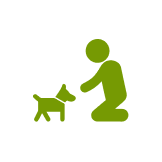Help us ensure a smooth delivery
Help us ensure a smooth delivery
SIZE GUIDE
Uncover the Ultimate Dog Food Choice for Your Beloved Canine
Providing your dog with the right nutrition is one of the most important aspects of their care. Just like humans, every dog has unique dietary needs based on factors like breed, size, age, and activity level. High-quality pet dog food ensures that your furry friend gets all the essential nutrients they need to thrive. Whether you’re feeding a small dog breed like a Shih Tzu or Pug, or larger dog breeds like a Labrador, German Shepherd, or Golden Retriever, there’s a wide range of options available.
- Dry kibble
- Wet food
- Grain-free
- Breed-specific
Finding the right food for dogs doesn’t have to be overwhelming. Our collection of premium dog foods is designed to meet the nutritional needs of dogs of all breeds, ensuring they live happy, healthy lives. Explore our selection today and discover the perfect meal plan for your dog, tailored to their unique requirements.
Find the Best Dog Food for Every Age, Size, and Breed
Selecting the right food for your dog is essential to their health and overall well-being. With so many options available, it’s important to consider factors such as your dog’s age, breed, size, and specific dietary needs. Whether you're looking for adult dog food, senior dog food, or food for small dogs, there are key aspects to keep in mind that will help you make an informed choice and we at Supertails aim to make these choices easier for you!
One of the most crucial steps in choosing the best dog food is to examine the ingredients. Look for high-quality proteins like chicken, lamb, or fish, paired with wholesome carbohydrates. Additionally, essential fatty acids, vitamins, and minerals play a vital role in maintaining a dog's health. This ensures that your dog's food is a complete and balanced dog food.
For small breeds, like Shih Tzus or Pugs, food for small dogs is often designed with smaller kibble sizes and nutrient ratios that meet their higher metabolism. For senior dogs, a formula that supports joint health and maintains a healthy weight is important, while adult dog food typically offers a balanced blend of protein and fats for sustained energy.
When selecting the right dog food ingredients, prioritize transparency—opt for brands that clearly state what’s inside their food, avoiding fillers, artificial preservatives, and unnecessary additives. Following these tips will ensure you find the best dog food for your pet, giving them the nutrition they need to lead a long and healthy life.
Discover the Best Dog Food Brands for Everyday Meals
To choose the right food for your furry companion, it’s essential to find options that match their specific dietary requirements. With the vast selection of the best dog food brands available at Supertails, you can find the ideal formula that meets your dog’s nutritional needs, whether they require grain-free, low-fat, or high-protein diets. We understand your dog’s unique needs, including any food sensitivities or allergies, are key to ensuring they get the proper nutrition.
For dogs with grain sensitivities or allergies, grain-free options are an excellent choice. Many of the good dog food brands offer grain-free formulas that are rich in protein and use alternative carbohydrates. This ensures a balanced diet while avoiding common allergens like wheat and corn. For dogs needing a lighter diet, low-fat formulas help manage weight while still providing essential nutrients.
For a convenient and balanced option, kibble dog food remains a popular choice among pet parents. Many best dog food brands offer high-quality kibble with carefully selected ingredients that promote healthy digestion, coat health, and overall vitality. Look for kibble that is formulated to be complete and balanced, ensuring it contains all the necessary nutrients for your dog’s well-being.
You can find the perfect dog food online, tailored to your dog’s dietary restrictions and needs. Browse through our selection of best dog food brands, from fresh dog food options to kibble dog food, to find the perfect match for your pet's health and happiness.
Discover the best food for dog with our top-rated options.. From dry food to wet food, find the perfect fit for your dog’s needs at great prices. Check out the details below!
What Makes Dog Food Stand Out?
High-Quality Protein Source
Protein sources of high quality include named animal protein like chicken, fish, and lamb as the primary ingredient of dog food, rather than ambiguous "meat derivatives." These protein sources are complete amino acids that enable the dog to remain healthy, maintain muscle mass, support the immune system, and remain energetic.
Essential Nutrient Balance
A high-quality dog food recipe contains protein, healthy fat, digestible carbohydrate, vitamins, and minerals in adequate amounts as defined by AAFCO standards, providing a properly balanced nutritional profile for a dog. Additionally, this nutrient composition provides strong bones/joints, a healthy coat, good digestive and overall immunity.
Age-Appropriate Nutrition
The best dog foods are tailored to life stage, offering extra protein, energy, and DHA for growing puppies, maintenance nutrition for adults, and adjusted calories plus joint and antioxidant support for seniors. Feeding age appropriate formulas helps reduce risks like obesity, developmental issues, or age related decline, so your dog gets what they need at every stage.
Dog Kibble vs. Wet Food: Which is Right for Your Dog?
The choice between dog kibble and wet food can be challenging. Both options have their own benefits, and selecting the right one often depends on your dog's age, health needs, and personal preferences. Understanding the differences between these types of healthy dog food can help you make an informed decision for your pet’s diet.
Dry food for dog is a popular choice of food among pet parents for reasons like:
- Convenience
- Affordability
- Long shelf life
Kibble also has the added benefit of helping with dental health, as the crunchy texture can reduce plaque buildup and support stronger teeth. When looking for nutritious food for dogs, be sure to choose high-quality kibble with named protein sources and wholesome grains or vegetables, free from artificial fillers.
On the other hand, Dog wet food can be more palatable and easier to chew, making it ideal for puppies and senior dogs. Wet food has higher moisture content and is beneficial for dogs who need to stay hydrated, especially if they don’t drink a lot of water. It’s often richer in taste, making it a great option for picky eaters who might turn up their noses at kibble.
For a balanced approach, many pet parents incorporate both types into their dog's diet, offering dog kibble as a regular meal and adding wet food occasionally for variety and added moisture. This can help keep mealtimes exciting while ensuring your dog receives a well-rounded diet.
Ultimately, the best choice depends on your dog’s specific needs. Consider factors like age, dental health, and dietary preferences when selecting between these options. Explore both types to find the perfect balance that keeps your furry friend happy, healthy, and satisfied.
Dive Deeper into Dog Nutrition
We know you want to be the best pet parent possible! Our experts have curated guides to help you make informed choices. Check out these related links:
- Learn how to spot high-quality ingredients and what to avoid by reading our detailed guide on choosing the right dog food.
- Supplementing Your Dog's Diet: Explore our collection of essential dog supplements and vitamins to address specific needs like joint pain or anxiety.
- Switching Foods The Right Way: Read our step-by-step guide to ensure a smooth transition when you introduce a new dry or wet dog food to your puppy.
Shop Now, Feed Well, and Enjoy the Happy Wags!
No more guesswork! Supertails brings you the best of global and local dog food right to your doorstep, with advice from our in-house vets just a click away. Give your pet the gift of premium nutrition today. Start browsing our curated collections, stock up on their favorite meals, and watch your dog thrive! Your companion deserves the best—and so do you!
FAQs
Which Dog Food in India is the Best?
Top dog food brands in India include Royal Canin for breed-specific formulas, Acana for high-protein, grain-free options, Orijen for biologically appropriate diets, Drools for affordable quality, Farmina N&D for grain-free, high-protein foods, and Pedigree for affordable choice. The best food depends on your dog’s age, breed, and health needs.
What are the 4 Types of Dog Food?
- Dry Food (Kibble): Convenient, long shelf life, helps with dental health.
- Wet Food (Canned): Rich in flavor, high moisture, good for hydration and picky eaters.
- Raw Food: Offers natural nutrition but requires careful handling.
- Freeze-Dried Food: High in nutrients, easy to store, and requires rehydration.
Why is My Dog Not Eating Food?
Possible reasons include stress from environment changes, illness or pain, diet changes, boredom with food, or behavioural reasons. If your dog hasn’t eaten for more than 24-48 hours, consult a vet to rule out health issues.
How Much Dog Food Should My Dog Eat?
The amount of dog food depends on your dog's size, age, and activity level. Generally, follow the guidelines on the dog food packaging and adjust based on your dog's needs and weight. Consult your vet for personalized advice to ensure your dog stays healthy and well-nourished.
Can I mix my dog wet and dry food?
Yes, mixing wet and dry dog food can be beneficial. It adds variety, helps keep your dog hydrated, and can improve taste and texture. Just ensure total daily food intake meets your dog's nutritional needs, and gradually introduce changes to avoid stomach upset.
Which is the best Dog Food Under ₹2500?
Pedigree is a popular, affordable dog food under ₹2500 in India. It offers balanced nutrition suitable for dogs of all ages. Brands like Hill's Science Diet and Arden Grange provide more specialized nutrition but can be pricier. Pedigree is widely available and budget-friendly.
Which is the Best Dog Food Under ₹1000?
Dog food under ₹1000 typically includes basic nutritional options like Pedigree small packs or local brands. For very tight budgets, smaller packs of reputed brands provide balanced nutrition. Always check ingredients to ensure quality, and consult a vet to suit your dog’s specific needs.




































































































































































